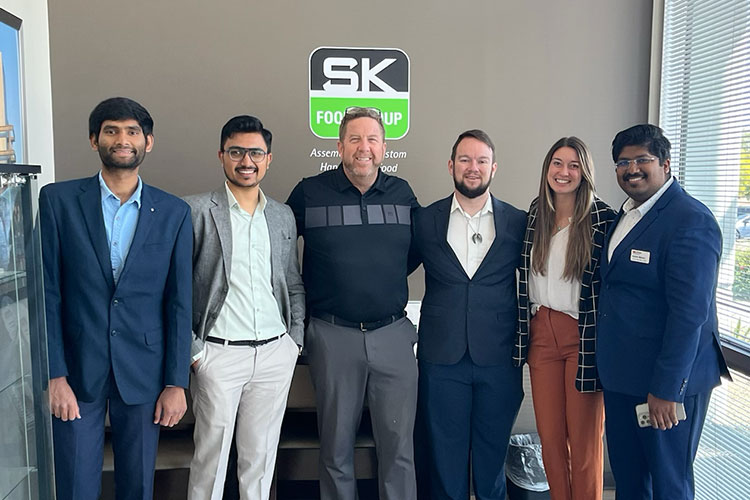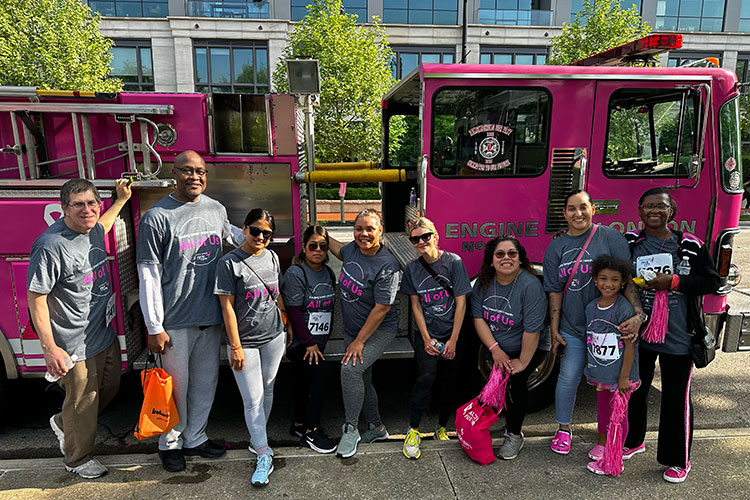In a dynamic collaboration, SK Food Group worked with the W.P. Carey MBA program at Arizona State University (ASU) to explore innovative solutions for enhancing SK’s internal supply chain. In this second partnership with the school, the initiative was led by Associates Tracy Atkinson, Senior Manager of Training and Development, and Damon Dalgleish, the Phoenix Plant Manager Director.
The Objective
The objective of this project was to review the internal flow of components from the warehouse storage locations to the decant (or de-boxing) area. The goal was to evaluate and determine a more efficient conversion and process for breaking down pallets and removing components from secondary packaging, making them ready for use on the manufacturing lines. In the process of this review, SK asked the students for input on how they could streamline and optimize the unpacking of supply pallets, in order to optimize efficiency and to establish a case per hour capability review.
This initiative not only provided the ASU MBA students a real-world platform to apply their academic knowledge but also motivated them to develop impactful solutions that would contribute positively to their grades and professional experience.
The Team
Under the leadership of Damon Dalgleish, the project was propelled by the insights and efforts of five ASU MBA students—Helen Tristano, Karthik Myneni, Sai Nandan Lanka, Matthew Allen, and Rajanikant Manubhai Gajera. All had prior professional experience that enriched the project, allowing for a deeper understanding and innovative approach to tackling the challenges at hand. With the help of their Professor, Greg Collins, the ASU team ensured that the solutions were both academically robust and practically applicable.
The Challenge
SK Food Group’s Phoenix facility was operating at peak capacity and needed innovative strategies to improve the flow of components from storage to production, optimize manpower and enhance the packaging process. These improvements were crucial for maintaining efficient production and scalability as the facility handled logistics involving the flow of components used to produce approximately 6 million finished goods per day.
The Approach
The students were introduced to the plant operations through a comprehensive tour, providing them with a solid understanding of the workflow and challenges. Utilizing the plant’s CCTV system extensively, the students were able to observe and analyze natural everyday workflows remotely, which allowed for substantial data collection without disrupting daily operations.
A key focus of their investigation was the potential implementation of AI in the decant area, which Dalgleish explained could project future component needs based on real-time production data, enhancing the warehouse team’s ability to anticipate and meet manufacturing demands.
The Findings
The team’s analysis pinpointed several opportunities for enhancing operations. They identified that pallet management could be significantly optimized. The existing organization led to inefficiencies in down-stacking operations that, once addressed, could streamline the process substantially. In terms of labor allocation, the students noted the mismatch of staff availability to fluctuating production demands.
By proposing a more dynamic staffing model, they anticipated reductions in periods of both understaffing and overstaffing, thereby smoothing operational peaks and lows. Additionally, the team addressed delays in the conveyor systems used to haul away empty boxes, where labor-intensive processes and equipment had slowed production cycles. Their recommendations for modifying the current design to better fit the current use of the space could accelerate throughput and reduce bottlenecks, setting the stage for sustained improvements in productivity and efficiency.
“Once we met this year’s group of students, we knew we had to challenge them, as they all had experience in the working world. The way they worked together and crunched key analytics was truly impressive. It was great to see them use our camera system which really accelerated the data mining and allowed for concrete ideas that will lead to improvements. It is very powerful when you can put together a basic understanding of the manufacturing industry with the fresh entrepreneurial attitude of MBA students.”
— Damon Dalgleish, Phoenix Plant Director
Conclusion
The partnership between SK Food Group and the ASU MBA program has yielded significant insights and proposed innovations, poised to enhance operational efficiency significantly. As the second successful academic partnership with ASU, the initiative offers a model for future collaborations by the SK team and highlights the potential of academic partnerships across SK’s growing number of manufacturing plants.
“Partnering with our ASU students and faculty yields a synergy of fresh perspectives and seasoned guidance. Their innovative ideas bring energy into the process, while their hunger for learning and applying new principles drives them to tackle challenges with enthusiasm and adaptability. Harnessing their academic rigor alongside our associates and their industry expertise fosters a dynamic collaboration that not only advances the project but cultivates the next generation of skilled professionals.”
— Tracy Atkinson, Senior Manager of Training and Development





